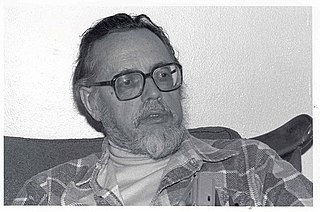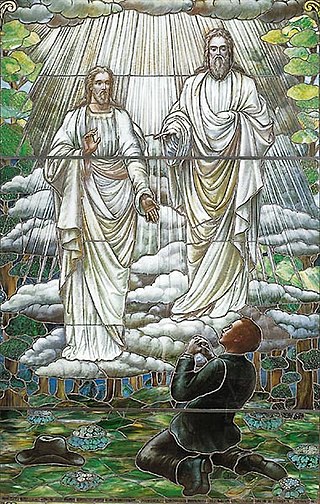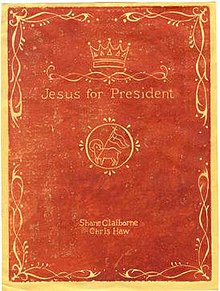The term Judeo-Christian is used to group Christianity and Judaism together, either in reference to Christianity's derivation from Judaism, Christianity's recognition of Jewish scripture to constitute the "Old Testament" of the Christian Bible, or due to the parallels or commonalities in Judaeo-Christian ethics shared by the two religions. The term "Judæo Christian" first appeared in the 19th century as a word for Jewish converts to Christianity.
The Christian left is a range of Christian political and social movements that largely embrace social justice principles and uphold a social doctrine or social gospel based on their interpretation of the teachings of Christianity. Given the inherent diversity in international political thought, the term Christian left can have different meanings and applications in different countries. While there is much overlap, the Christian left is distinct from liberal Christianity, meaning not all Christian leftists are liberal Christians and vice versa.

In ecclesiology, the Christian Church is what different Christian denominations conceive of as being the true body of Christians or the original institution established by Jesus. "Christian Church" has also been used in academia as a synonym for Christianity, despite the fact that it is composed of multiple churches or denominations, many of which hold a doctrinal claim of being the "one true church", to the exclusion of the others.
Christian reconstructionism is a fundamentalist Calvinist theonomic movement. It developed primarily under the direction of Rousas Rushdoony, Greg Bahnsen and Gary North and has had an important influence on the Christian right in the United States. Its central theme is that society should be reconstructed under the lordship of Jesus in all aspects of life. In keeping with the biblical cultural mandate, reconstructionists advocate for theonomy and the restoration of certain biblical laws said to have continued applicability. These include the death penalty not only for murder, but also for idolatry, open homosexuality, adultery, witchcraft and blasphemy.

Anthony Campolo is an American sociologist, Baptist pastor, author, public speaker and former spiritual advisor to U.S. President Bill Clinton. Campolo is known as one of the most influential leaders in the evangelical left and has been a major proponent of progressive thought and reform within the evangelical community. He has also become a leader of the Red-Letter Christian movement, which aims to put emphasis on the teachings of Jesus. Campolo is a popular commentator on religious, political, and social issues, and has been a guest on programs such as The Colbert Report, The Charlie Rose Show, Larry King Live, Nightline, Crossfire, Politically Incorrect and The Hour.
Progressive Christianity represents a postmodern theological approach, and is not necessarily synonymous with progressive politics. It developed out of the liberal Christianity of the modern era, which was rooted in the Enlightenment's thinking. Progressive Christianity is a postliberal theological movement within Christianity that, in the words of Reverend Roger Wolsey, "seeks to reform the faith via the insights of post-modernism and a reclaiming of the truth beyond the verifiable historicity and factuality of the passages in the Bible by affirming the truths within the stories that may not have actually happened."
Liberal Christianity, also known as Liberal Theology and historically as Christian Modernism, is a movement that interprets Christian teaching by taking into consideration modern knowledge, science and ethics. It emphasizes the importance of reason and experience over doctrinal authority. Liberal Christians view their theology as an alternative to both atheistic rationalism and theologies based on traditional interpretations of external authority, such as the Bible or sacred tradition.

James E. Wallis Jr. is an American theologian, writer, teacher and political activist. He is best known as the founder and editor of Sojourners magazine and as the founder of the Washington, D.C.-based Christian community of the same name. In 2021, Wallis joined Georgetown University as the inaugural Archbishop Desmond Tutu Chair in Faith and Justice. He also leads the Center on Faith and Justice at Georgetown. Wallis is known for his advocacy on issues of peace and social justice. Although Wallis actively eschews political labels, he describes himself as an evangelical and is often associated with the evangelical left and the wider Christian left. He worked as a spiritual advisor to President Barack Obama. He is also a leader in the Red-Letter Christian movement.

John Howard Yoder was an American Mennonite theologian and ethicist best known for his defense of Christian pacifism. His most influential book was The Politics of Jesus, which was first published in 1972. Yoder was a Mennonite and wrote from an Anabaptist perspective. He spent the latter part of his career teaching at the University of Notre Dame.

The "New Perspective on Paul" is a movement within the field of biblical studies concerned with the understanding of the writings of the Apostle Paul. The "new perspective" was started with liberal scholar E. P. Sanders' 1977 work Paul and Palestinian Judaism. The old Protestant perspective claims that Paul advocates justification through faith in Jesus Christ over justification through works of the Law. After the Reformation, this perspective was known as sola fide; this was traditionally understood as Paul arguing that Christians' good works would not factor into their salvation – only their faith would count. In this perspective, first-century Second Temple Judaism is dismissed as sterile and legalistic.
Norman Leo Geisler was an American Christian systematic theologian, philosopher, and apologist. He was the co-founder of two non-denominational evangelical seminaries.
Conservative Christianity, also known as conservative theology, theological conservatism, traditional Christianity, or biblical orthodoxy is a grouping of overlapping and denominationally diverse theological movements within Christianity that seeks to retain the orthodox and long-standing traditions and beliefs of Christianity, it is contrasted with Liberal Christianity and Progressive Christianity which are seen as heterodoxies by theological conservatives. Conservative Christianity should not be mistaken as being synonymous with the political philosophy of conservatism nor the Christian right which is a political movement of Christians who support conservative political ideologies and policies within the realm of secular or non-sectarian politics. The two major subdivisions of Conservative Christianity within Protestantism are Evangelical Christianity and Christian Fundamentalism while the Confessing Movement, Confessionalism, and Neo-orthodoxy make up the remaining within Protestantism. Theological conservatism is also found in Roman Catholicism and is also found within Eastern Christianity although neither having a direct connection with the Fundamentalist–Modernist controversy.
Criticism of Christianity has a long history which stretches back to the initial formation of the religion in the Roman Empire. Critics have challenged Christian beliefs and teachings as well as Christian actions, from the Crusades to modern terrorism. The arguments against Christianity include the suppositions that it is a faith of violence, corruption, superstition, polytheism, homophobia, bigotry, pontification, abuses of women's rights and sectarianism.

Positive Christianity was a movement within Nazi Germany which promoted the belief that the racial purity of the German people should be maintained by mixing racialistic Nazi ideology with either fundamental or significant elements of Nicene Christianity. Adolf Hitler used the term in point 24 of the 1920 Nazi Party Platform, stating: "the Party as such represents the viewpoint of Positive Christianity without binding itself to any particular denomination". The Nazi movement had been hostile to Germany's established churches. The new Nazi idea of Positive Christianity allayed the fears of Germany's Christian majority by implying that the Nazi movement was not anti-Christian. That said, in 1937, Hans Kerrl, the Reich Minister for Church Affairs, explained that "Positive Christianity" was not "dependent upon the Apostle's Creed", nor was it dependent on "faith in Christ as the son of God", upon which Christianity relied, rather, it was represented by the Nazi Party: "The Führer is the herald of a new revelation", he said. Hitler's public presentation of Positive Christianity as a traditional Christian faith differed. Despite Hitler's insistence on a unified peace with the Christian churches, to accord with Nazi antisemitism, Positive Christianity advocates also sought to distance themselves from the Jewish origins of Christ and the Christian Bible. Based on such elements, most of Positive Christianity separated itself from traditional Nicene Christianity and as a result, it is in general considered apostate by all mainstream Trinitarian Christian churches, regardless of whether they are Catholic, Eastern Orthodox, or Protestant.
Red-Letter Christians is a non-denominational movement within Evangelical Christianity. "Red-Letter" refers to New Testament verses and parts of verses printed in red ink, to indicate the words attributed to Jesus without the use of quotations.

Stephen John Chalke is a British Baptist minister, the founder of the Oasis Charitable Trust, a former United Nations' Special Adviser on Human Trafficking and a social activist.

Shane Claiborne is an evangelical Christian leader, an author, one of the founding members of the non-profit organization, The Simple Way, in Philadelphia, Pennsylvania, cofounder of the Red-Letter Christians. Claiborne is also a social activist, advocating for nonviolence and service to the poor. He is the author of the book, The Irresistible Revolution: Living as an Ordinary Radical.

Mormonism and Nicene Christianity have a complex theological, historical, and sociological relationship. Mormons express their doctrines using biblical terminology. They have similar views about the nature of Jesus Christ's atonement, bodily resurrection, and Second Coming as mainstream Christians. Nevertheless, most Mormons do not accept the doctrine of the Trinity as codified in the Nicene Creed of 325 and the Nicene-Constantinopolitan Creed of 381. Although Mormons consider the Protestant Bible to be holy scripture, they do not believe in biblical inerrancy. They have also adopted additional scriptures that they believe to have been divinely revealed to Joseph Smith, including the Book of Mormon, the Doctrine and Covenants, and the Pearl of Great Price. Mormons practice baptism and celebrate the sacrament of the Lord's Supper, but they also participate in other religious rituals. Mormons self-identify as Christians.

The Ordinary Radicals is a 2008 documentary film directed by Philadelphia filmmaker Jamie Moffett.

Chris Haw is a Catholic theologian and professor in the United States.











